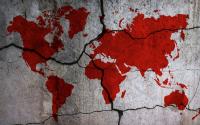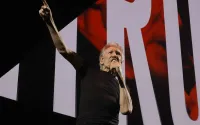1 February 2006David Cromwell
"One fundamental goal of any well-crafted indoctrination program is to direct attention elsewhere, away from effective power, its roots, and the disguises it assumes." (Noam Chomsky, 'Deterring Democracy', Vintage, 1992, p.303)Of Realists And Stalinists
The Independent is feeling the heat from public criticism of its adverts pushing foreign travel, cars and endless consumerism. A recent editorial noted:
"Just ponder this as you flick through those holiday brochures and even the travel pages of this newspaper to brighten up the grey January days... Fuelled by cheap flights, the British wanderlust seems far from sated. Fuelled is the operative word here. For the cost of cheap flights may be low in pounds sterling but the cost to the environment is high." ('All these flights abroad could end up costing us the earth', leader, The Independent, January 28, 2006)
It is rare indeed for a paper to even hint at the negative impacts of the advertising it carries.
Over at the Independent on Sunday (IoS), deputy editor Michael Williams dismissed readers protesting the paper's climate-killing adverts as "a curmudgeonly lot of puritans, miseries, killjoys, Stalinists and glooms." (Williams, 'A bottle of bubbly for the best way to fly', Independent on Sunday, January 22, 2006)
It would seem the "Stalinists" who aspire to radical media reform are beyond the pale: "Welcome to Mars (or North Korea)!". Williams refuses to recognise that his paper's heavy reliance on advertising revenue is only one of a series of filters protecting the public from unpalatable truths about power in society.
The Independent and IoS environment editors - Michael McCarthy and Geoffrey Lean, respectively - are equally disinclined to subject the concept of economic 'growth' (actually, depletion of resources and increasing inequality worldwide), to critical examination, or to explore the hijacking of 'democratically' elected governments by corporate power. As for the media's integral role as part of the problem - forget it!
In yesterday's Independent, McCarthy demonstrated the outer limits of permissible reporting - even in our 'best' media. He rightly noted the "remarkable and menacing findings" of climate science in a new book arising from a major conference, Avoiding Dangerous Climate Change, held last year at the UK's Met Office (McCarthy, 'Climate poses increased threat', The Independent, January 30, 2006).
Climate scientists are now warning of the real risk of a 5-metre rise in sea level because of melting ice sheets in Greenland and Antarctica. There are other dangers too: notably the increase in the acidity of the world's oceans - with severe consequences for the marine food web and the ability of the ocean to absorb carbon dioxide emissions - and the possible collapse of the North Atlantic 'conveyor belt' that includes the Gulf Stream.
As we noted in our media alert on coverage of the UK Met Office conference last year, the concept that government and big business [are] perpetrating climate crimes against humanity is simply off the news agenda. ('Is The Earth Really Finished?', March 1, 2005, http://www.medialens.org/alerts/05/050301_is_the_earth_really_finished.php)
Where are the news reports on how economic 'growth' is destroying the planet and impoverishing billions? Where are the BBC Ten O'Clock News headlines declaring 'Big business is once again blocking action on climate change', and 'Industry is spending billions on PR campaigns to fuel dangerous consumption'? When did ITN news bulletins last declare 'The government is succumbing to intense lobbying from the nuclear industry', or 'Global capitalism is destroying the planet's life-support systems'?
Instead, the 'serious' press scratches its collective head quizzically. Thus Oliver Duff observes in the Independent:
"Journalists have a responsibility to cover climate change, but make the pieces too gloomy and readers will fail to listen." (Oliver Duff, 'Green issues: It's not the end of the world', The Independent, January 9, 2006)
Duff was responding to a recent report titled 'The Media and Climate Change' by Futerra, a "green communications agency" (http://www.futerracom.org/auto.php?inc=news&news_id=78). Futerra claimed that climate reporting "is so hopelessly doom-laden in tone that readers have become apathetic about the threat."
In fact, the media report oncoming climate catastrophe, when they report it at all, without discussing the radical changes needed to combat the threat. It is coverage of the symptoms of the problem - in the absence of serious coverage of the causes or solutions - that is depressing.
Financial Greenwash: The Epitome of Climate Concealment
Fiona Harvey, environment editor of the Financial Times, "topped the reporters' league" in the Futerra report with her "prolific" articles on climate change. Conforming to the norm for media coverage, Harvey says "she tries to emphasise practical measures that readers can take to tackle climate change." (Duff, op. cit.)
On January 30, 2006, Media Lens carried out a newspaper database search of her articles between that date and January 1, 2005. Searching for "Fiona Harvey" and "climate change" yielded a total of 242 articles. The usual "good" reporting in the serious media that emphasises "energy efficiency" (63 articles) and its focus on the "consumer" (35 articles) became quickly apparent.
What was also clear was how little attention Harvey - the "best" environment reporter in the UK press - had devoted to vital issues in those 242 articles, as the following search results indicate:
"National Association of Manufacturers" 1"advertising" 4"greenwash" 1"propaganda" 0"social justice" 2"contraction" or "convergence" 0"social equity" 0"spin" 1
Readers may recall previous alerts where we have shown the concerted opposition of business groups such as the National Association of Manufacturers (NAM), comprising the bulk of US industry, to government policy on cutting emissions. NAM is US-based, but many of its corporate members have global operations. Harvey's sole passing mention of NAM, and its stance on carbon cuts, merely notes that it "stands firm against such restrictions." (Financial Times, January 28, 2005)
Harvey also consistently ignores the heavy dependence of corporate media on advertising revenue. Of her 4 articles that mention "advertising", 3 refer to government advertising campaigns targeted at consumers to reduce emissions. The fourth article refers in passing to ExxonMobil who had "launched an advertising campaign emphasising the importance of understanding greenhouse gas emissions and their effect on the climate."
Although Harvey does write that ExxonMobil "has in the past given funding to climate-change sceptics", no further details are given; nor is the cynicism and obstructionism of the oil giant explored. (Harvey, 'Giant expects its example to be followed. General Electric is not the first company to see a competitive advantage in environmental vows - but it is the biggest', Financial Times, July 1, 2005)
The single mention of "greenwash" in our search of Harvey articles in the FT is attributed to "activists [who] decry" businesses "as environmentally friendly while continuing to deploy destructive tactics in the background." By contrast, Harvey's approval of a "pragmatic" approach is clear when she notes that "environmental pressure groups have been reaching an accommodation with businesses, forming partnerships with companies in order to influence the way managers conduct their operations." It is no surprise that these quotes are lifted from an interview with the arch "green" pragmatist himself, Jonathan Porritt. (Harvey, 'How to reap profits and save the earth too', Financial Times, November 7, 2005)
As for the 2 mentions of "social justice", these only appear because Harvey, like all disciplined mainstream reporters, uncritically echoes the claims of government policy. The single mention of "spin" appears in a quote by a Friends of the Earth activist about the G8 climate discussions in Gleneagles last year: "There will be a lot of spin to sell this as a strong agreement when it is not. It will have been watered down to suit the US." ('France and US bury differences to allow consensus on climate change', Financial Times, Caroline Daniel and Fiona Harvey, Financial Times, July 8, 2005)
Harvey includes the FoE quote for 'balance' before moving swiftly on. Elsewhere, Harvey heroically overlooks the endemic use of spin - propaganda in any honest terminology - by the UK government to sell its supposed green credentials.
Recall that this power-friendly reporting is the epitome of climate coverage in the mainstream UK press today. The consequences for humanity, if this media failure continues, could be terminal.
SUGGESTED ACTION
The goal of Media Lens is to promote rationality, compassion and respect for others. In writing letters to journalists, we strongly urge readers to maintain a polite, non-aggressive and non-abusive tone. Write to one or more of the journalists and editors below. It is more effective to write in your own words.
Write to Michael Williams, readers' editor of the Independent on SundayEmail: [email protected]
Write to Geoffrey Lean, environment editor of the Independent on Sunday:Email: [email protected]
Write to Tristan Davies, editor of the Independent on Sunday:Email: [email protected]
Write to Michael McCarthy, environment editor of the Independent:Email: [email protected]
Write to Simon Kelner, editor of the Independent:Email: [email protected]
Write to Fiona Harvey, environment editor of the Financial Times:Email: [email protected]
Write to Lionel Barber, editor of the Financial Times:Email: [email protected] Please also send copies of all emails to Media Lens:Email: [email protected]
The first Media Lens book has just been published: 'Guardians of Power: The Myth Of The Liberal Media' by David Edwards and David Cromwell (Pluto Books, London, 2006). For further details, please click here:
http://www.medialens.org/bookshop/guardians_of_power.php
This is a free service. However, financial support is vital. Please consider donating to Media Lens: www.medialens.org/donate
Visit the Media Lens website: http://www.medialens.org
http://www.zmag.org/content/print_article.cfm?itemID=9637§ionID=57






